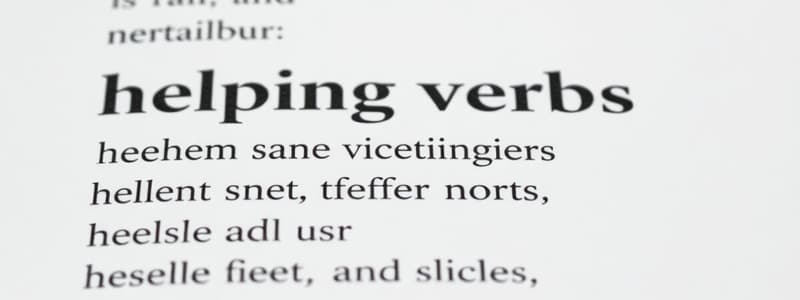Podcast
Questions and Answers
What is the primary purpose of a helping verb?
What is the primary purpose of a helping verb?
- To indicate the time of an action
- To provide additional support to the main verb (correct)
- To change the mood of the action
- To function as a standalone verb
Which of the following is NOT a common helping verb in English?
Which of the following is NOT a common helping verb in English?
- Make (correct)
- Shall
- Can
- Have
How should a main action verb be used in relation to a helping verb?
How should a main action verb be used in relation to a helping verb?
- It must always be conjugated
- It can be omitted
- It should be pluralized
- It should remain in its simple form (correct)
What is an example of using a helping verb correctly in a sentence?
What is an example of using a helping verb correctly in a sentence?
Which of the following statements about the verb 'have' is true?
Which of the following statements about the verb 'have' is true?
What role does 'would' play as a helping verb?
What role does 'would' play as a helping verb?
Which of the following is an example of the use of 'do' as a helping verb?
Which of the following is an example of the use of 'do' as a helping verb?
Which of the following is false regarding the use of helping verbs?
Which of the following is false regarding the use of helping verbs?
Which phrase would you use to ask if someone speaks Spanish?
Which phrase would you use to ask if someone speaks Spanish?
What is the English translation of 'Por favor, discúlpeme'?
What is the English translation of 'Por favor, discúlpeme'?
How do you say 'I do not understand' in Spanish?
How do you say 'I do not understand' in Spanish?
Which phrase would be the appropriate way to say thank you?
Which phrase would be the appropriate way to say thank you?
What does '¿Cuándo?' translate to in English?
What does '¿Cuándo?' translate to in English?
If you want to ask how much something costs in Spanish, which phrase would you use?
If you want to ask how much something costs in Spanish, which phrase would you use?
Which phrase would you use to invite someone to come in?
Which phrase would you use to invite someone to come in?
How would you express that you are from a certain place in Spanish?
How would you express that you are from a certain place in Spanish?
What does '¿Cuánto cuesta un boleto a...?' mean?
What does '¿Cuánto cuesta un boleto a...?' mean?
Which question would you ask to find out if you can bring your luggage?
Which question would you ask to find out if you can bring your luggage?
What is the meaning of 'Esto es todo lo que tengo'?
What is the meaning of 'Esto es todo lo que tengo'?
What does '¿Hay seguro para viajeros?' ask about?
What does '¿Hay seguro para viajeros?' ask about?
In which scenario would you use 'Tenga cuidado'?
In which scenario would you use 'Tenga cuidado'?
What does '¿Debo pagar esto ahora o después?' mean?
What does '¿Debo pagar esto ahora o después?' mean?
What does 'Quiero dejar estas maletas un rato' express?
What does 'Quiero dejar estas maletas un rato' express?
What scenario is expressed by 'Mi automóvil no funciona'?
What scenario is expressed by 'Mi automóvil no funciona'?
What does 'No encuentro a mis amigos' mean?
What does 'No encuentro a mis amigos' mean?
How do you say 'How do you spell it?' in Spanish?
How do you say 'How do you spell it?' in Spanish?
What is the English translation of 'Olvidé mi dinero'?
What is the English translation of 'Olvidé mi dinero'?
What does '¿Dónde está la jefatura de policía?' ask?
What does '¿Dónde está la jefatura de policía?' ask?
Which phrase means 'I am glad'?
Which phrase means 'I am glad'?
If someone says 'He perdido mi tren', what are they saying?
If someone says 'He perdido mi tren', what are they saying?
What does 'Usted dijo que costaría...' imply?
What does 'Usted dijo que costaría...' imply?
What is the English meaning of '¿Cómo se llama esto en inglés?'?
What is the English meaning of '¿Cómo se llama esto en inglés?'?
What is the English translation of 'Prohibido fumar'?
What is the English translation of 'Prohibido fumar'?
What does 'Entrada' translate to in English?
What does 'Entrada' translate to in English?
The phrase 'Manejar con cuidado' is best translated to:
The phrase 'Manejar con cuidado' is best translated to:
What is the meaning of 'Sentido único'?
What is the meaning of 'Sentido único'?
Which of the following translates 'No hay paso'?
Which of the following translates 'No hay paso'?
What is the English meaning of 'Baje la velocidad'?
What is the English meaning of 'Baje la velocidad'?
What does 'Cables de alta tensión' refer to in English?
What does 'Cables de alta tensión' refer to in English?
What is the translation for 'Prohibido la entrada'?
What is the translation for 'Prohibido la entrada'?
What is the correct structure for using auxiliary verbs in a negative form?
What is the correct structure for using auxiliary verbs in a negative form?
Which of the following describes a regular verb?
Which of the following describes a regular verb?
What distinguishes an irregular verb from a regular verb?
What distinguishes an irregular verb from a regular verb?
How can one identify whether a verb is regular or irregular in its infinitive form?
How can one identify whether a verb is regular or irregular in its infinitive form?
Which auxiliary verb is used in the structure to form negative sentences?
Which auxiliary verb is used in the structure to form negative sentences?
What is indicated by the term 'criterion of regularity' in verb usage?
What is indicated by the term 'criterion of regularity' in verb usage?
What two basic forms are mentioned for forming questions in English?
What two basic forms are mentioned for forming questions in English?
What is a unique characteristic of past participles in relation to regular and irregular verbs?
What is a unique characteristic of past participles in relation to regular and irregular verbs?
Flashcards
Helping verb
Helping verb
A verb that supports or describes the main action verb. It's not an adverb.
Auxiliary verb
Auxiliary verb
Helper verbs used in English grammar to form tenses and questions, not part of the main verb
To be
To be
Common auxiliary verb used to form tenses and questions.
Can/Could
Can/Could
Signup and view all the flashcards
Would/Should
Would/Should
Signup and view all the flashcards
Have/Has
Have/Has
Signup and view all the flashcards
Do
Do
Signup and view all the flashcards
Will/Going to
Will/Going to
Signup and view all the flashcards
Regular Verbs
Regular Verbs
Signup and view all the flashcards
Irregular Verbs
Irregular Verbs
Signup and view all the flashcards
Past Participle
Past Participle
Signup and view all the flashcards
Infinitive
Infinitive
Signup and view all the flashcards
Question words
Question words
Signup and view all the flashcards
Past Tense
Past Tense
Signup and view all the flashcards
Question Formation in English
Question Formation in English
Signup and view all the flashcards
Expressing Regret
Expressing Regret
Signup and view all the flashcards
Asking for Something
Asking for Something
Signup and view all the flashcards
Taking Responsibility
Taking Responsibility
Signup and view all the flashcards
Asking for the Culprit
Asking for the Culprit
Signup and view all the flashcards
Expressing Ignorance
Expressing Ignorance
Signup and view all the flashcards
Stating an Opinion
Stating an Opinion
Signup and view all the flashcards
Asking for the Purpose
Asking for the Purpose
Signup and view all the flashcards
Requesting a Translation
Requesting a Translation
Signup and view all the flashcards
Asking Questions in Spanish
Asking Questions in Spanish
Signup and view all the flashcards
Useful Expressions
Useful Expressions
Signup and view all the flashcards
Spanish Pronunciation
Spanish Pronunciation
Signup and view all the flashcards
Asking for Repetition
Asking for Repetition
Signup and view all the flashcards
Expressing 'It's Old/New'
Expressing 'It's Old/New'
Signup and view all the flashcards
Asking for the Price
Asking for the Price
Signup and view all the flashcards
Expressing 'Come In'
Expressing 'Come In'
Signup and view all the flashcards
Asking 'How Far?' in Spanish
Asking 'How Far?' in Spanish
Signup and view all the flashcards
Round Trip Ticket
Round Trip Ticket
Signup and view all the flashcards
One-way Ticket
One-way Ticket
Signup and view all the flashcards
Travel Insurance
Travel Insurance
Signup and view all the flashcards
Claim Luggage
Claim Luggage
Signup and view all the flashcards
How much baggage can I take?
How much baggage can I take?
Signup and view all the flashcards
How much is a ticket to...?
How much is a ticket to...?
Signup and view all the flashcards
Can I get something to eat on the way?
Can I get something to eat on the way?
Signup and view all the flashcards
Handle this very carefully
Handle this very carefully
Signup and view all the flashcards
Boulevard
Boulevard
Signup and view all the flashcards
Closed
Closed
Signup and view all the flashcards
Crossroads
Crossroads
Signup and view all the flashcards
Curve
Curve
Signup and view all the flashcards
Danger
Danger
Signup and view all the flashcards
Detour
Detour
Signup and view all the flashcards
Entrance
Entrance
Signup and view all the flashcards
Exit
Exit
Signup and view all the flashcards
Study Notes
Basic English Learning Manual
- This manual is for learning basic English phrases
- The author is Hanna Jaff Bosdet
- The book is dedicated to the author's family, especially her mother
- The manual provides a table of contents with various English vocabulary and grammar topics.
- A prologue and introduction provide guidance and context to the learning process.
- Phonetic approximations of English pronunciation are provided.
- The manual includes a list of regular and irregular verbs with their conjugation.
- The manual provides various English expressions.
- The manual includes sections for useful expressions, addressing difficulties, greetings and introductions, travel, restaurants and food, shopping, banking and health situations.
- The manual has example sentences and explanations.
Studying That Suits You
Use AI to generate personalized quizzes and flashcards to suit your learning preferences.




